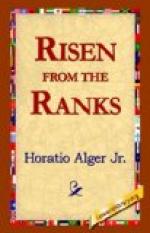As the two boys sat in front of the fire, popping and eating the corn, and chatting of one thing and another, their acquaintance improved rapidly. Harry learned that Oscar’s father was a Boston merchant, in the Calcutta trade, with a counting-room on Long Wharf. Oscar was a year older than himself, and the oldest child. He had a sister of thirteen, named Florence, and a younger brother, Charlie, now ten. They lived on Beacon Street, opposite the Common. Though Harry had never lived in Boston, be knew that this was a fashionable street, and he had no difficulty in inferring that Mr. Vincent was a rich man. He felt what a wide gulf there was socially between himself and Oscar; one the son of a very poor country farmer, the other the son of a merchant prince. But nothing in Oscar’s manner indicated the faintest feeling of superiority, and this pleased Harry. I may as well say, however, that our hero was not one to show any foolish subserviency to a richer boy; he thought mainly of Oscar’s superiority in knowledge; and although the latter was far ahead of Harry on this score, he was not one to boast of it.
Harry, in return for Oscar’s confidence, acquainted him with his own adventures since he had started out to earn his own living. Oscar was most interested in his apprenticeship to the ventriloquist.
“It must have been jolly fun,” he said. “I shouldn’t mind travelling round with him myself. Can you perform any tricks?”
“A few,” said Harry.
“Show me some, that’s a good fellow.”
“If you won’t show others. Professor Henderson wouldn’t like to have his tricks generally known. I could show more if I had the articles he uses. But I can do some without.”
“Go ahead, Professor. I’m all attention.”
Not having served an apprenticeship to a magician, as Harry did, I will not undertake to describe the few simple tricks which he had picked up, and now exhibited for the entertainment of his companion. It is enough to say that they were quite satisfactory, and that Oscar professed his intention to puzzle his Boston friends with them, when his vacation arrived.
About half-past eight, a knock was heard at the door.
“Come in!” called out Oscar.
The door was opened, and a boy about his own age entered. His name was Fitzgerald Fletcher. He was also a Boston boy, and the son of a retail merchant, doing business on Washington street. His father lived handsomely, and was supposed to be rich. At any rate Fitzgerald supposed him to be so, and was very proud of the fact. He generally let any new acquaintances understand very speedily that his father was a man of property, and that his family moved in the first circles of Boston Society. He cultivated the acquaintance of those boys who belonged to rich families, and did not fail to show the superiority which he felt to those of less abundant means. For example, he liked to be considered intimate with




